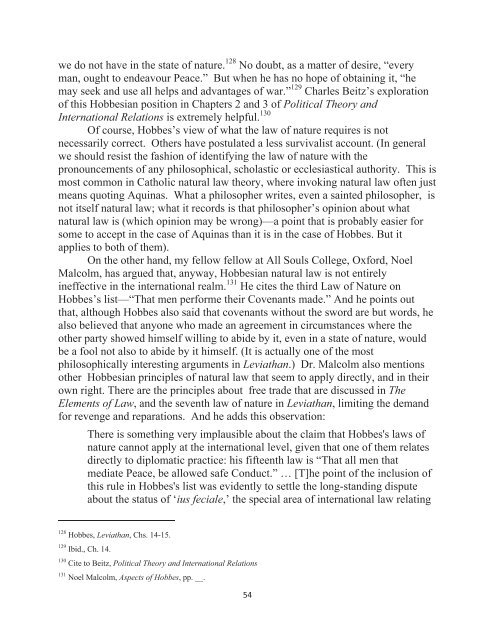International Legal Evangelism: Intelligence, Reconnaissance & Missions
International Legal Evangelism: Intelligence, Reconnaissance & Missions
International Legal Evangelism: Intelligence, Reconnaissance & Missions
You also want an ePaper? Increase the reach of your titles
YUMPU automatically turns print PDFs into web optimized ePapers that Google loves.
we do not have in the state of nature. 128 No doubt, as a matter of desire, “every<br />
man, ought to endeavour Peace.” But when he has no hope of obtaining it, “he<br />
may seek and use all helps and advantages of war.” 129 Charles Beitz’s exploration<br />
of this Hobbesian position in Chapters 2 and 3 of Political Theory and<br />
<strong>International</strong> Relations is extremely helpful. 130<br />
Of course, Hobbes’s view of what the law of nature requires is not<br />
necessarily correct. Others have postulated a less survivalist account. (In general<br />
we should resist the fashion of identifying the law of nature with the<br />
pronouncements of any philosophical, scholastic or ecclesiastical authority. This is<br />
most common in Catholic natural law theory, where invoking natural law often just<br />
means quoting Aquinas. What a philosopher writes, even a sainted philosopher, is<br />
not itself natural law; what it records is that philosopher’s opinion about what<br />
natural law is (which opinion may be wrong)—a point that is probably easier for<br />
some to accept in the case of Aquinas than it is in the case of Hobbes. But it<br />
applies to both of them).<br />
On the other hand, my fellow fellow at All Souls College, Oxford, Noel<br />
Malcolm, has argued that, anyway, Hobbesian natural law is not entirely<br />
ineffective in the international realm. 131 He cites the third Law of Nature on<br />
Hobbes’s list—“That men performe their Covenants made.” And he points out<br />
that, although Hobbes also said that covenants without the sword are but words, he<br />
also believed that anyone who made an agreement in circumstances where the<br />
other party showed himself willing to abide by it, even in a state of nature, would<br />
be a fool not also to abide by it himself. (It is actually one of the most<br />
philosophically interesting arguments in Leviathan.) Dr. Malcolm also mentions<br />
other Hobbesian principles of natural law that seem to apply directly, and in their<br />
own right. There are the principles about free trade that are discussed in The<br />
Elements of Law, and the seventh law of nature in Leviathan, limiting the demand<br />
for revenge and reparations. And he adds this observation:<br />
There is something very implausible about the claim that Hobbes's laws of<br />
nature cannot apply at the international level, given that one of them relates<br />
directly to diplomatic practice: his fifteenth law is “That all men that<br />
mediate Peace, be allowed safe Conduct.” … [T]he point of the inclusion of<br />
this rule in Hobbes's list was evidently to settle the long-standing dispute<br />
about the status of ‘ius feciale,’ the special area of international law relating<br />
<br />
128 Hobbes, Leviathan, Chs. 14-15.<br />
129 Ibid., Ch. 14.<br />
130 Cite to Beitz, Political Theory and <strong>International</strong> Relations<br />
131 Noel Malcolm, Aspects of Hobbes, pp. __.<br />
<br />
54

















